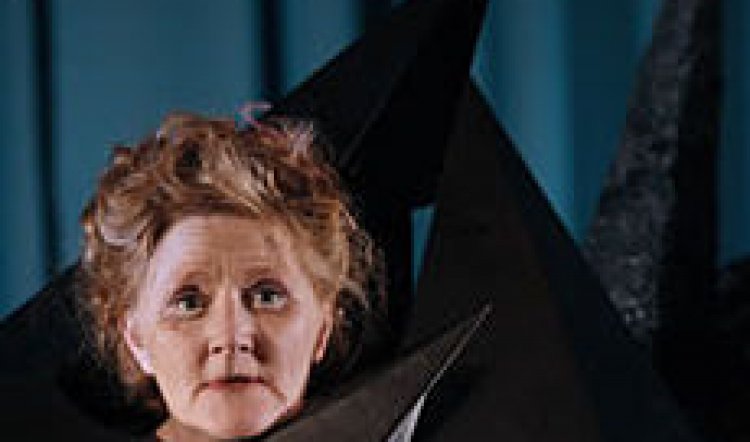
Happy Days
HAPPY DAYS Company B Belvoir and Malthouse at Upstairs Belvoir, November 7-December 13, 2009.
MUCH ANTICIPATED, the Melbourne Malthouse/Michael Kantor production of Samuel Beckett’s Happy Days has finally arrived at Belvoir Street. What this really means is that Julie Forsyth has finally arrived here in the role of the tragic optimist Winnie, that she first played for Jean-Pierre Mignon’s Anthill something like 20 years ago.
Forsyth is a once in a generation actor; unique, powerful, idiosyncratic, intelligent, playful, tender and unforgettable. She brings all these attributes to bear as Winnie. This foolish, ageing woman whose helpless and hopeful prattle keeps at bay the horrors of whatever final darkness we might imagine. It is an outstanding, heart-wrenching performance.
It’s not simply the Julie Forsyth show, however.
Peter Carroll, as her rarely seen husband Willie, is a monument to the long suffering, impotent aggression of the post-WW2 husband. He is a man who no longer has a war to fight, no place of his own in the world and no power in life or within his marriage. His predicament is all the more extraordinary for being mainly invisible and unspoken; and this in turn underlines the even greater sadness of Winnie’s plight: the more she babbles, the more she insists this is “a happy day”, the more she smiles and dreams of an impossible outcome, the more apparent the stark reality of her life’s quandary becomes.
Samuel Beckett is, without argument, one of the great playwrights of the 20th century and hearing this play, as well as watching it, is – in the hands of Forsyth and Carroll an exhilarating and profoundly moving experience. The rhythms and depth of the language – and, as importantly, the orchestrated silences – means the viewer/listener is easily hypnotised into the worlds, both present and past, of the two actors.
For me at least, listening to Winnie chirruping as she reminisces and daydreams and conjures her illusory happy days became a real phenomenon in the theatre as images and memories of Forsyth as the small boy in Raymond Cousse’s Kid Stuff hung in the air – in echoes of voice, motive, artless innocence and ultimate tragedy. The DNA of that character from at least two decades ago is in Winnie in 2009.
-c750x442.jpg)
Similarly, Peter Carroll’s befuddled but subtly malevolent and possibly murderous Willie is also steeped in the powerful juices of his past, in this instance as the Demon Barber in the 1988 MTC production of Sweeney Todd. These wraiths, or echoes, or memories – call them what you will – are inevitably in the ether when actors such as Carroll and Forsyth inhabit a stage. Nevertheless, it’s something that’s rarely mentioned; and may even be considered a bit infra dig. But actually, if you think about it, we are all the sum of our lives’ experiences – actors and audiences alike. Put actors and an audience together and you have a potentially amazing melange of the human experience and the human condition.
Anyway, that – I would like to suggest – is what happens when you have an actor such as Julie Forsyth and a text such as Beckett’s 1961 Happy Days – it moves hearts and minds and mountains.
What perhaps should have been moved, preferably right out of the theatre, is the set. Happy Days – an ironic or allegorical title, by the way, lest you go along expecting the Fonz or a rib-tickling romp – is essentially a woman trapped in a life in her mind’s eye. A mound of sand or earth, in which she is partially and then almost totally buried, represents it. The Beckett Estate is notoriously tough and immovable on how the plays are staged – as Belvoir’s boss Neil Armfield remembers – but that must apply only to the texts, otherwise the great man’s grandson and most vociferous guardian would surely have been leaping up and down over Anna Cordingley’s rather obviously post-apocalyptic set.
Rather than her encroaching mound of soil with notions of desert and heat, Winnie is surrounded by jagged, broken bits of metal and debris that suggests the World Trade Centre ruins of 9/11. The in-your-face nature of the construction – a highly dramatic statement in itself – is an odd, over-egged, choice. It reeks of a lack of confidence in the text and the performer, which is weird and wrong. Initially it distracts and attempts a narrative all its own. That it fails is due to the overwhelming authority and magic of Julie Forsyth and Samuel Beckett. It’s not to be missed.
PS and warning Some members of the audience on opening night reported being unable to see much of the action from the three lowest rows in the block furthest from the doors. Unless the jagged extremities of the set (that conceal Carroll and Forsyth) are clipped, it would seem fair to sell these seats at a reduced price as "restricted view".



